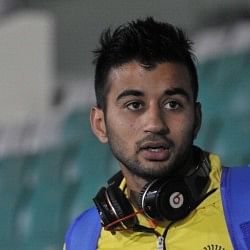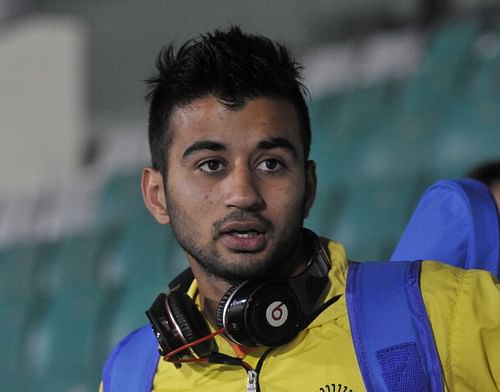
India's chance for glory at the Junior World Cup Hockey tournament

Indian Junior Hockey team captain Manpreet Singh during a practice session at the National Stadium for the upcoming Junior Men’s Hockey World Cup on November 29, 2013 in New Delhi, India.
The Junior World Cup Hockey tournament which started in Versailles, France in 1979 is being staged in India for the first time, from Dec. 6 to 15. The 10th edition of this tournament is being held at the Major Dhyan Chand, National stadium Delhi. India has won this title once in 2001 in Hobart, Australia beating Argentina 6-1 in the final, with Deepak Thakur getting a memorable hat-trick in just six minutes, and was runners up in 1997 at Milton Keynes, England, losing 2-3 to Australia.
Incidentally the current coach of the Indian Junior hockey team, Baljit Singh Saini, a skillful right half back was the team captain at the 6th Junior World Cup in England. Mercurial striker Gagan Ajit Singh, now a DSP in Punjab Police, was India’s captain when they won the 7th Junior World cup in the Tasmanian capital, Hobart. In the recent 9th Junior World Cup held at Singapore and Johor Bauru (Malaysia), India finished 9th, their worst showing in this prestigious competition till date.
As Hero Honda are the sponsors, this event is being officially called the Hero Hockey Junior World Cup hockey tournament for men. The ease, with which sponsors are procured in India, is the major reason why the FIH is granting several international hockey tournaments to the country. At the same venue the 12th Hero Honda FIH World Cup hockey tournament for men was staged in 2010, from Feb. 28 till March 10. The Hero Hockey World League final rounds will be held in Delhi from January 10-18, 2014. The senior World Cup hockey tournament will be held in India once again in 2018, either in Chennai or Delhi.
If the Indian Hockey Federation and Hockey India can settle their differences soon and a unified body emerges, they can be a powerful force in international hockey. Creditably any international hockey tournament staged in India generates massive revenue for the international body. India’s matches like the 2010 Commonwealth games semi finals against England or the clash with Pakistan in the 2010 World Cup were witnessed by a capacity crowd of about 25-30,000 people. So revenue from ticket sales is also ample. The FIH realizes this and so in the near future has granted several international competitions to India. It also helps that thanks to the 2010 Commonwealth Games, the existing infrastructure in Delhi, the Dhyan Chand National stadium and the revamped Shivaji stadium are world class venues.
The Dhyan Chand, National hockey stadium will soon achieve a unique status. It will become the only hockey stadium in the world which has staged the World Cup, Junior World Cup, Commonwealth Games and Asian Games. Next year the 35th men’s Champions trophy will be staged here from Dec. 13—21.
All the 18 players in India’s Junior World Cup squad have played with the senior team, with five of them regulars. Overall they have played 324 international matches. Senior India midfielder Kothajit Singh, 20, is the most experienced with 89 international matches while skipper Manpreet has played 85 matches. Defender Amit Rohidas will be Manpreet’s deputy. Dashing forward Ramandeep Singh, who made his debut in the recent Asia Cup, has also found a place in the side. Surprisingly talented Air India forward Affan Yousuf has been kept in the reserve. Affan Yousuf excelled in Air India’s victory in the national championships in Pimpri Chinchwaad, Pune in June this year and is a good goal poacher. His absence may be missed in crucial matches.
The inaugural edition of the Hockey India league held earlier this year also helped to discover several young players who have now been chosen for the Junior World Cup hockey tournament. Crafty forwards Mandeep Singh and Malak Singh excelled for Ranchi Rhinos and Punjab Warriors respectively. Midfielder Satbir Singh shone for Mumbai Magicians and penalty corner expert Amit Rohidas excelled for Ranchi Rhinos. The exposure that these players got In the Hockey India league should boost their confidence and help them in the Junior World Cup.
As the junior World Cup is being held in India, the hosts are one of the favourites for the title. Overall India has won this title once (2001) finished runners up once (1997) and fourth in 2005. Three Indians have finished as top-scorers in this tournament, defender and penalty corner expert Mohinderpal (M.P.) Singh in 1979, when India finished fifth, skilful Rajiv Misra in 1997 and striker Deepak Thakur, the son of a Himachal Pradesh government driver in Una, in 2001.
Besides success on the field, the Junior World Cup (U-21 years) is seen as a stepping stone to the senior national team. In that aspect, India has been quite successful, especially since 1997. From the 1997 squad, skipper Baljit Saini, defenders Dilip Tirkey (now a Rajya Sabha MP) and Lazarus Barla and forward Samir Dad became regulars in the national squad.
The majority of the title winning team in 2001 went on to represent India with distinction in the senior international tournaments. They were also fortunate that their coach Rajender Singh took over as National coach a year later. So at the 2002 Busan Asian Games, several of the Junior World Cup winning stars were pitch-forked into the national team. They were goalkeeper Devesh Chauhan, defenders Jugraj Singh and Kanwalpreet Singh, midfielders Bimal Lakra, Vikram Pillay, Ignace Tirkey, Prabodh Tirkey and Viren Rasquinha and forwards Deepak Thakur, Gagan Ajit Singh, Prabhjot Singh and Tejbir Singh. This batch of players excelled at the senior level also. They bagged the silver medal at the 2002 Busan Asian Games, won both the Asia Cup and Afro-Asian Games title in 2003 and finished fourth in the Champions trophy in 2002, 2003 and 2004. The quartet of Bimal Lakra, Prabhjot, Prabodh and Ignace Tirkey were even members of the Indian squad which won the 7th Asia Cup in Chennai in 2007, trouncing South Korea 7-2 in the final. The wiry Prabhjot Singh became the star of the tournament, finishing as top-scorer with 15 goals.
The Indian squad of 2013 starts with a baptism by fire. They take on Netherlands on the opening day on Dec. 6, next play Canada on Dec. 8 and finish against tenacious South Korea on Tuesday Dec. 12. It is a tough group and will be a test of the talent and temperament of the Junior India team. An opening day loss to Netherlands could affect the squad’s morale. In contrast when India won the title in 2001 at Hobart they had a relatively easier start trouncing Scotland 7-1, beating Canada 5-0 and Spain 3-0.
In 2013, India is in Pool C and need to finish among the top two to progress to the knock out quarter final stage. If India finishes as runner up in Group C, they are likely to meet a tough contender England, favoured to win Group D. India will have an easier task if they manage to win group C as they will play the group D runners up, either New Zealand or Malaysia.
So winning Group C is India’s best chance of reaching the semi final stage of the 10th Junior World Cup hockey tournament. In the last four they could face any of title favourites five times champions Germany, Australia, arch rivals Pakistan or dark horses Belgium or Argentina. It will be commendable if the Indian team reaches the last four as title aspirations then depend on playing two good matches.
In October 2001, India was on the verge of being knocked out at the Championship round (quarter final league), of the 7th Junior World Cup as they needed to beat Netherlands in their last match. The Netherlands could have qualified with just a draw. India rose to the occasion and won 4-3 inspired by skipper Gagan Ajit’s emotional words, hum field pe kab nachenge (When will we be the ones dancing on the field)?” and “Hamara din kab aayega (When is it going to be our day)?”
If the current Indian skipper Manpreet Singh can similarly inspire his side to victory in the Junior World Cup, it will overcome the National stadium jinx. Whenever a major final has been held at the Dhyan Chand National stadium, India has fumbled. In both the 1982 Asian Games and 2010 Commonwealth games final, India got humiliated by their opponents. In 1982 they lost 1-7 to Pakistan and in 2010 were vanquished 0-8 by Australia. In the 2010 World Cup held here, India finished eighth out of the 12 participating teams.